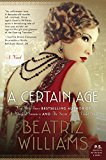Book Club Discussion Questions
Want to participate in our book club? Join BookBrowse and get free books to discuss!
Please be aware that this discussion guide will contain spoilers!
- By the tone of the first few pages, did you get the sense that A Certain Age was set during the period between World War I and World War II? Why or why not? How does the author set the stage for the era when describing the Roaring Twenties in New York City?
- Soon after she's married to the most eligible bachelor in New York, Theresa discovers he keeps a mistress and has done so for most of their courtship. Still, she puts up with his philandering, bears him three children, and takes a lover of her own, until he asks for a divorce. It's clear she wonders if that was the "right" choice. Given what you know about Theresa's character at the beginning of the novel, do you think she followed the best path? How about at the end of the novel?
- At the beginning of the novel, Boyo is beautiful and alluring because he can't have what he most wants: Theresa. Theresa loves Boyo but knows she's not who Boyo thinks she is --- she's twice his age and (at that point) married to a man with a mistress. Isn't the point of an affair to get close to a feeling you can't quite possess? Is it possible for an affair to work if both parties have nothing to lose?
- Theresa and her husband have an open relationship. He keeps a mistress, and she's allowed to do what she pleases as long as she's discreet. Judging from the rest of the book, it seems that such sexual indiscretions are commonplace and accepted in certain circles. Why might affairs have been more permissible during the 1920s than they are today? Is monogamy part of the natural order of things, or should flings be allowed once in a while if neither party sees the harm in it?
- Julie Schuyler is a feisty character. At one point, she says to Sophie: "It never does any good to sit around the house, waiting for your man to arrive. That's the old rules." A perfect example of subverting the gender roles of the times. These days, neither sex really waits around for each other or returns phone calls or texts when they should. Do you see this as freedom or inconsiderate behavior? Does it help the romance cause or hinder it?
- A Certain Age is set in the 1920s in the era of speakeasies and bootlegging. Which scenes did you gravitate towards most: the underground parties full of flappers, smoke, and jazz of Julie Schuyler's taste, or the upper-crust soirees decorated with crinoline, lace and fancy cocktails? Do you get a sense that the author preferred writing about one over the other?
- Many of the scenes between Boyo and Theresa, and Sophie and Octavian/Mr. Rofrano are romantic, but each for a different reason. Which scenes do you think are more convincing? What qualities make up the perfect romantic scene?
- Timing is everything in A Certain Age --- Theresa and Boyo's first meeting, Sophie's introduction to Octavian just as she's planning to marry Jay, Theresa's brother, the phone call Sophie makes to Octavian when Theresa just happens to be over. Williams wields time and chance to propel the plot to its shocking conclusion. Do you think she succeeds? Why or why not?
- Sophie and Theresa are alter egos of a sort. Do you identify with one over the other? Who were you rooting for to win Octavian's heart? Did your opinion of him change throughout the course of the novel?
- Williams sprinkles reportages of a trial involving Octavian, Theresa and Sophie's father throughout the book. What do Patty Cake's articles add to the plot and each character's development? Do they seem jarring, or does the truth of their contents add necessary tension to the narrative?
- When Sophie announces her change of plans regarding her marriage to Jay, were you rooting for her or Theresa? At that point in the novel, what did you think might happen next? Were you surprised by what happened at the end of the scene?
- As Sophie denounces her plan to get married, she looks around the room at the rich women and thinks, "Not one of these women has earned a single penny in her life, has she? Her clothes, her apartment, her house in the country, her jewels, her shoes, the bottle of milk in her icebox: all of them have been paid for by the industry of some other person. She is beautifully, uselessly, benevolently beholden. Left to herself, she couldn't possibly sustain this luxury. She couldn't even sustain necessity." Is there anything wrong, per se, with these marriages of convenience? If given the choice, would you rather be terribly broke and in love, or filthy rich and beholden?
- What a suspenseful ending! Did you piece any of the mystery together before the truth was revealed? What clues gave the ending away?
- Theresa makes two choices at the end of the novel. Does it fit her character, and what does it say about the way she's evolved? Would you have made the same choice if you were in her shoes? Why or why not?
Unless otherwise stated, this discussion guide is reprinted with the permission of William Morrow.
Any page references refer to a USA edition of the book, usually the trade paperback version, and may vary in other editions.




